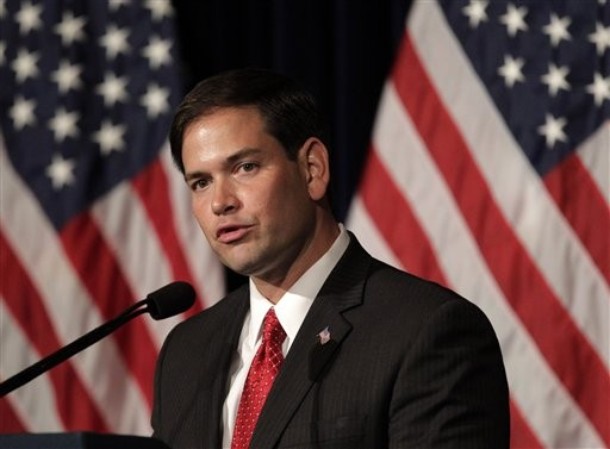
From Marco Rubio, the Office of Senator Rubio: [I]f we still have to lead, can’t we at least be equal partners with someone else? In fact, shouldn’t we rely on other nations to carry more of the burden? After all, we all know that they resent us telling them what to do, right?
In this new century, more than ever before, America should work with our capable allies in finding solutions to global problems. Not because America has gotten weaker, but because our partners have grown stronger. It’s worth pointing out, by the way that is not a new idea for us. Our greatest successes have always occurred in partnership with other like-minded nations. America has acted unilaterally in the past – and I believe it should continue to do so in the future — when necessity requires. But our preferred option since the U.S. became a global leader has been to work with others to achieve our goals.
So yes, global problems do require international coalitions. On that point this administration is correct. But effective international coalitions don’t form themselves. They need to be instigated and led, and more often than not, they can only be instigated and led by us. And that is what this administration doesn’t understand. Yes, there are more countries able and willing to join efforts to meet the global challenges of our time. But experience has proven that American leadership is almost always indispensable to its success. . . .
[T]he growing strategic importance of Asia actually heightens rather than diminishes the strategic importance of Europe. U.S-European cooperation is a valuable complement to our work with our East Asia allies. All of us — Asians, Americans, and Europeans — have a common interest in seeing China evolve in a peaceful and democratic direction. And we have a common interest in seeing China abide by the rules of the international economic order. The United States, Europe and East Asia represent 71 percent of the world’s economy. That’s a lot of leverage, and we should use it to address problems such as China’s disregard for intellectual property rights, gross human rights violations, its unfair trade practices, its currency manipulation, and the looming presence of China’s state-owned industries.
In addition, this U.S.-EU partnership is critical to a more realistic approach to Russia as well. I know some here might disagree, and certainly the President would, but I feel like we have gotten precious little from Russia in exchange for concessions on nuclear weapons.
The reason is because Russia’s domestic politics shape its foreign policies. An autocratic Russia tends to be more anti-Western, and to act in ways that make it harder to integrate Russia into the global community and the free international political order.
Putin might talk tough, but he knows he is weak. Everywhere he looks, he sees threats to his rule, real and imagined. And so he uses state-owned media to preach paranoia and anti-Western sentiments to Russians. He faces a rising China to the east and hostile Islamic forces to the South, but he tells his people that the biggest threat they face is from NATO.
Some of our allies in Europe increasingly feel that our recent "reset" with Russia tended to ignore and in some cases, undermine them. We need to re-energize and lead a united coalition with European nations to tackle issues ranging from missile defense to the continued enlargement of NATO. Furthermore, if we are successful in forming a Western Hemisphere energy coalition that takes advantage of the shale-gas revolution, we will be able to help our European allies reduce their coerced dependence on Russian energy as well.
A re-energized U.S.-European coalition can help empower those forces within Russia working to end corruption and open their political system. And if that happens, then we will be closer than ever to the bipartisan American vision, endorsed by the Clinton administration and the Bush administrations, of a Europe "whole and free."
Excerpt from remarks by Senator Marco Rubio, "The Future of U.S. Foreign Policy." (photo: AP)
Image: ap%204%2026%2012%20Marco%20Rubio.jpg
